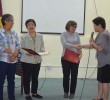25 February 2012
Gov’t trying to dupe public with flawed employment definition – KMU
“The Aquino government is using flawed statistics to try to deceive the public into believing that the current administration is addressing massive unemployment, hunger, and poverty in the country.”
This was the response of labor center Kilusang Mayo Uno to the Aquino government’s downplaying of the results of a survey conducted by the Social Weather Stations (SWS) which indicated that unemployment increased to 24 percent from June to December 2011.
The December 2011 SWS survey showed that unemployment among adult Filipinos has increased to 24 per cent, equivalent to around 9.7 million Filipinos. It is 1.1 per cent higher than the unemployment rate of in June 2011, which was 22.9 percent.
Flawed employment definition
The Department of Labor and Employment disputed the survey results, saying these are “not comparable with the quarterly Labor Force Survey of the National Statistics Office (NSO), which is the official reference of the government and by the World Bank, ADB, IMF, ILO, and other Philippine development partners.”
“The SWS survey and the NSO data are indeed not comparable. The NSO is using a flawed definition of ‘employed’ and ‘unemployed’,” said Elmer “Bong” Labog, KMU chairperson.
“The Aquino government is not addressing the basic needs of workers and people but wants to prettify its image,” he added.
KMU added that the Aquino government’s lowering of the poverty threshold from P52 to P46 per day artificially reduced the number of poor by a significant 5.3 million compared with the old methodology.
SWS, for its surveys, used the traditional definition of unemployment as comprising those not working and at the same time looking for work. On the other hand, NSO used the revised unemployment definition that was implemented in 2005, which excluded those not looking for work.
KMU criticized the NSO for counting as employed “those who do any work even for one hour during the reference period for pay or profit, or work without pay on the farm or business enterprise operated by a member of the same household related by blood, marriage or adoption.”
“That definition is appalling and unacceptable. How can workers and people rely on the Aquino government to improve their lives if it insists in using flawed definitions of employment, hunger, and poverty as basis of its economic policies?” Labog said.
Low quality, contractual work
Referring to the SWS unemployment surveys from March to December 2011, KMU reiterated its previous statement that if there has been any decline in the unemployment rate as was the case in the June 2011 survey, it was because low-quality and unstable or contractual jobs that have been created.
After five months, workers’ contracts may not be renewed or in other cases, workers leave their jobs because of poor working conditions.
Based on the December 2011 SWS survey, 33.3 per cent of the 9.7 million unemployed Filipinos either did not renew their contracts or were laid off; 37.5 per cent of the unemployed resigned or voluntarily left their jobs.
“The SWS survey only reflects the workers and people’s worsening economic condition under the Aquino government. The Aquino government affirmed contractualization in the Philippine Airlines’s case,” said Labog.
For reference:
Elmer ‘Bong’ Labog, 0908-1636-597
KMU chairperson
[box type=”info”] IMPORTANT NOTICE: INBOX is an archive of press releases, statements, announcements, letters to the editors, and manifestos sent to Davao Today for publication. Please email your materials to davaotoday@gmail.com. Davao Today is not responsible for the content of these materials. The opinion expessed in these items does not reflect those of Davao Today and its staff. Please refer to our terms of use/disclaimer.[/box]










